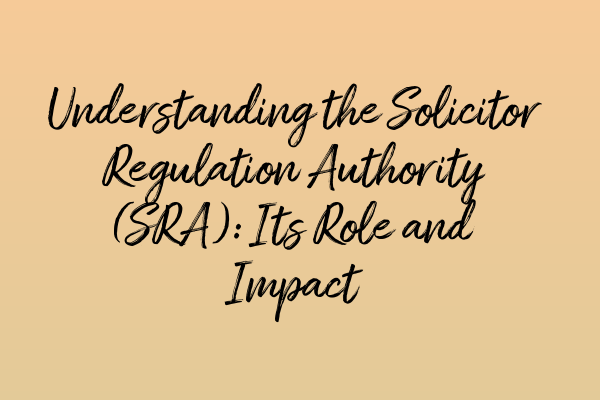Understanding the Solicitor Regulation Authority (SRA): Its Role and Impact
In the legal landscape, the Solicitor Regulation Authority (SRA) plays a crucial role in maintaining the integrity and professionalism of solicitors. As an independent regulatory body, the SRA sets the standards and regulations that solicitors in England and Wales must adhere to, ensuring that they provide competent and ethical legal services to their clients. In this article, we will delve into the role and impact of the SRA, providing you with a comprehensive understanding of its significance.
1. Regulation and Oversight
The primary role of the SRA is to regulate solicitors and law firms, ensuring that they meet the highest standards of professionalism and conduct. This includes setting out rules and regulations that govern solicitors’ behavior, as well as monitoring their compliance with these rules. By providing oversight and enforcing these regulations, the SRA aims to maintain public confidence and trust in the legal profession.
Having a regulatory body such as the SRA is essential for ensuring that solicitors are accountable for their actions and adhere to the ethical standards expected of them. This helps safeguard the interests of clients and ensures that they receive competent and ethical legal services.
To maintain a high level of accountability, the SRA operates a robust system of checks and balances. It conducts regular inspections and audits of law firms, investigating any instances of misconduct or breaches of rules. This proactive approach helps to identify and address potential issues before they escalate, thereby protecting the interests of both clients and solicitors.
2. Standards and Qualifications
In addition to regulating solicitors’ behavior, the SRA also sets the standards and qualifications required to enter and practice the legal profession. This includes overseeing the education and training of aspiring solicitors, ensuring that they receive the necessary knowledge and skills to provide quality legal services.
By setting rigorous standards and qualifications, the SRA ensures that solicitors possess the expertise and competence required to handle complex legal matters. This not only benefits clients by ensuring they receive high-quality legal advice, but it also enhances the reputation of the legal profession as a whole.
The SRA’s focus on continuous professional development encourages solicitors to stay updated with the latest legal developments and advancements. This helps them provide accurate and reliable advice to their clients while maintaining their own professional growth.
If you’re interested in exploring various aspects of criminal law, you might find the following articles informative:
– Private Prosecutions: Exploring Non-Governmental Prosecutions in Criminal Cases
– Ethical Challenges in Criminal Defence: Navigating Dilemmas
– Understanding Drug-related Offences: Laws and Penalties in the UK
– Magistrates’ Court vs Crown Court: Different Paths in Criminal Proceedings
– Criminal Defence Strategies: Expert Approaches to Protecting Clients’ Interests
3. Public Protection
Another crucial aspect of the SRA’s role is protecting the public from dishonest, unethical, or incompetent solicitors. The SRA investigates complaints against solicitors, taking disciplinary action when necessary. This ensures that solicitors who fail to meet the required standards are held accountable for their actions.
By taking prompt and effective action against solicitors who breach the rules, the SRA helps maintain public confidence in the legal profession. This is particularly important in complex legal matters, such as criminal cases, where individuals rely on solicitors to protect their rights and provide effective representation.
The SRA’s disciplinary measures can range from issuing warnings and fines to suspending or striking off solicitors from the roll. These measures not only protect the public but also serve as a deterrent to solicitors who may consider engaging in unethical or unprofessional conduct.
4. Engaging with the Legal Community
The SRA actively engages with solicitors, law firms, and the wider legal community to ensure that its regulations and policies are effective and up to date. It seeks feedback and input from stakeholders, allowing the legal profession to shape and influence its regulatory framework.
This engagement also helps address any concerns or challenges faced by solicitors, enabling the SRA to refine and improve its regulations. By fostering open communication and collaboration, the SRA aims to create a regulatory environment that supports and promotes the highest standards of practice in the legal profession.
In conclusion, the Solicitor Regulation Authority (SRA) plays a vital role in ensuring the integrity, professionalism, and accountability of solicitors in England and Wales. Through its regulation, standards, and disciplinary measures, the SRA aims to maintain public confidence in the legal profession. By protecting the public, upholding ethical standards, and engaging with the legal community, the SRA continues to make a significant impact on the legal landscape.


Leave a Reply